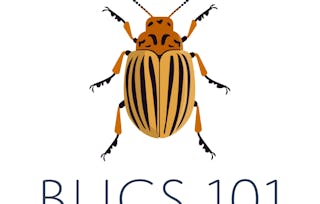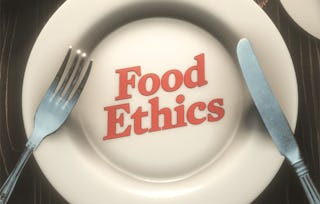Ce cours en anglais couvre la science et la sociologie des insectes en tant qu'aliments pour les humains et les animaux. Au fil des ans, les médias, les investisseurs et les politiques publiques ont accordé une attention croissante au rôle que les insectes pourraient jouer dans l'avenir de l'alimentation. La consommation d'insectes peut-elle réellement sauver le monde de la famine et de la destruction de l'environnement ? L'ajout d'insectes au régime alimentaire présente-t-il des avantages ou des inconvénients pour la santé ? Tous les peuples accepteront-ils les insectes comme nourriture ? Peut-on les donner à manger au bétail ? Devons-nous promouvoir les insectes comestibles et, dans l'affirmative, quelle est la meilleure façon de le faire ? Quelles espèces allons-nous manger et comment allons-nous les élever ? Ce cours examine tous les aspects de la question des insectes comestibles. Les étudiants reçoivent un aperçu général mais complet du domaine et sont invités à réfléchir en classe au rôle qu'ils pensent que les insectes joueront dans leur propre avenir alimentaire, et aux raisons qui les poussent à penser de la sorte.

Insectes comestibles

39 avis
Expérience recommandée
Ce que vous apprendrez
Réfléchissez de manière critique aux raisons pour lesquelles nous mangeons certaines choses et pas d'autres, et aux influences culturelles qui façonnent ces opinions.
Décrire et évaluer les arguments qui motivent le mouvement en faveur des insectes comestibles.
Connaître des exemples d'insectes comestibles et d'autres produits à base d'insectes dans le monde entier.
Pouvoir appliquer la théorie de la diffusion des innovations aux innovations dans le domaine alimentaire.
Comprendre dans quelle direction s'oriente le secteur des insectes comestibles et peut-être décider du rôle qu'ils veulent y jouer.
Compétences que vous acquerrez
- Catégorie : Pharmaceuticals
- Catégorie : Social Sciences
- Catégorie : Nutrition and Diet
- Catégorie : Biotechnology
- Catégorie : Cooking
- Catégorie : Socioeconomics
- Catégorie : Economic Development
- Catégorie : Food Safety and Sanitation
- Catégorie : Environment and Resource Management
- Catégorie : Cultural Diversity
- Catégorie : Food and Beverage
- Catégorie : Law, Regulation, and Compliance
- Catégorie : Innovation
- Catégorie : Environmental Science
- Catégorie : Ethical Standards And Conduct
- Catégorie : Biology
- Catégorie : Culture
- Catégorie : Sustainability Standards
- Catégorie : Sustainable Development
Détails à connaître

Ajouter à votre profil LinkedIn
Découvrez comment les employés des entreprises prestigieuses maîtrisent des compétences recherchées

Il y a 8 modules dans ce cours
Bonjour à tous ! Bienvenue sur le site Edible Insects ! Ce cours en anglais couvre la science et la sociologie des insectes en tant qu'aliments pour les humains et les animaux. Au fil des ans, les médias, les investisseurs et les politiques publiques ont accordé une attention croissante au rôle que les insectes pourraient jouer dans l'avenir de l'alimentation. La consommation d'insectes peut-elle réellement sauver le monde de la famine et de la destruction de l'environnement ? L'ajout d'insectes au régime alimentaire présente-t-il des avantages ou des inconvénients pour la santé ? Tous les peuples accepteront-ils les insectes comme nourriture ? Peut-on les donner à manger au bétail ? Devons-nous promouvoir les insectes comestibles et, dans l'affirmative, quelle est la meilleure façon de le faire ? Quelles espèces allons-nous manger et comment allons-nous les élever ? Ce cours examine tous les aspects des insectes comestibles. Les étudiants reçoivent un aperçu général mais complet du domaine et sont invités à réfléchir en classe au rôle qu'ils pensent que les insectes joueront dans leur propre avenir alimentaire et aux raisons qui les poussent à penser de la sorte.
Inclus
1 vidéo1 lecture
Cette conférence amène les élèves à réfléchir profondément à ce qui influence nos idées sur la "nourriture", en remettant en question leurs idées reçues. Pourquoi mangeons-nous certains animaux et pas d'autres ? Pourquoi certaines parties d'animaux et pas d'autres ? Nous présenterons ensuite le concept de la consommation d'insectes en particulier, ainsi qu'un aperçu de la théorie de la diffusion des innovations, qui sera appliquée tout au long du cours lors de l'examen des raisons pour lesquelles la consommation d'insectes a été adoptée ou non dans différentes parties du monde.
Inclus
12 vidéos2 lectures1 devoir1 sujet de discussion
Cette conférence offre un large aperçu des insectes comestibles traditionnels et modernes du monde entier, et de leur évolution au fil du temps.
Inclus
12 vidéos1 lecture1 devoir
Dans ce cours, les étudiants apprendront et analyseront les arguments des écologistes en faveur de la consommation de protéines d'insectes, et débattront des questions éthiques liées à la consommation d'insectes. Ils se familiariseront également avec la nutrition et la sécurité des insectes comestibles. À la fin de l'exposé, les élèves devraient être en mesure de décider, sur la base de faits, si la consommation d'insectes est acceptable pour eux et de justifier leur choix.
Inclus
12 vidéos2 lectures1 devoir2 sujets de discussion
Cette conférence couvre largement les techniques d'élevage de certains des insectes comestibles les plus couramment cultivés, tant pour l'alimentation humaine que pour l'alimentation animale, ainsi que les raisons socio-économiques pour lesquelles la technologie d'élevage est si importante.
Inclus
12 vidéos2 lectures1 devoir
Cette conférence aborde les aspects post-production des insectes comestibles. Comment les insectes sont-ils préparés, cuits, traités et emballés ? Quels sont les marchés cibles des insectes comestibles et quelles sont les meilleures stratégies de marketing pour les atteindre ? Enfin, la conférence aborde les aspects juridiques des insectes comestibles.
Inclus
12 vidéos1 devoir2 sujets de discussion
Ce cours couvre les produits dérivés des insectes en dehors de la consommation directe d'insectes en tant qu'aliments. Cela inclut les produits comestibles et non comestibles, les services rendus par les insectes et les insectes en tant que médicaments. À la fin, les étudiants apprécieront les divers rôles que jouent les insectes dans l'industrie humaine.
Inclus
12 vidéos1 devoir2 sujets de discussion
Inclus
2 lectures2 évaluations par les pairs
Instructeur

Offert par
En savoir plus sur Sciences de l'environnement et durabilité
 Statut : Gratuit
Statut : GratuitUniversity of Alberta
 Statut : Essai gratuit
Statut : Essai gratuitStanford University
 Statut : Prévisualisation
Statut : PrévisualisationUniversity of Pennsylvania
 Statut : Gratuit
Statut : GratuitPrinceton University
Pour quelles raisons les étudiants sur Coursera nous choisissent-ils pour leur carrière ?

Felipe M.

Jennifer J.

Larry W.

Chaitanya A.
Avis des étudiants
- 5 stars
87,17 %
- 4 stars
10,25 %
- 3 stars
0 %
- 2 stars
0 %
- 1 star
2,56 %
Affichage de 3 sur 39
Révisé le 18 juil. 2025
Edible Insects is a great course to begin understanding the role of insects in both the modern and ancient world, as well as the ideas, development, and business around entomophagy (eating insects)
Révisé le 20 sept. 2023
Super informative, thorough, covering a great range of topics and well designed to educate, entertain, and inspire. Great Work!
Révisé le 26 sept. 2023
Excellent course! Thank you! Well written and delivered; it was enlightening, interesting and entertaining!

Ouvrez de nouvelles portes avec Coursera Plus
Accès illimité à 10,000+ cours de niveau international, projets pratiques et programmes de certification prêts à l'emploi - tous inclus dans votre abonnement.
Faites progresser votre carrière avec un diplôme en ligne
Obtenez un diplôme auprès d’universités de renommée mondiale - 100 % en ligne
Rejoignez plus de 3 400 entreprises mondiales qui ont choisi Coursera pour les affaires
Améliorez les compétences de vos employés pour exceller dans l’économie numérique
Foire Aux Questions
Pour accéder aux supports de cours, aux devoirs et pour obtenir un certificat, vous devez acheter l'expérience de certificat lorsque vous vous inscrivez à un cours. Vous pouvez essayer un essai gratuit ou demander une aide financière. Le cours peut proposer l'option "Cours complet, pas de certificat". Cette option vous permet de consulter tous les supports de cours, de soumettre les évaluations requises et d'obtenir une note finale. Cela signifie également que vous ne pourrez pas acheter un certificat d'expérience.
Lorsque vous achetez un certificat, vous avez accès à tous les supports de cours, y compris les devoirs notés. Une fois le cours terminé, votre certificat électronique sera ajouté à votre page de réalisations - à partir de là, vous pouvez imprimer votre certificat ou l'ajouter à votre profil LinkedIn.
Oui, pour certains programmes de formation, vous pouvez demander une aide financière ou une bourse si vous n'avez pas les moyens de payer les frais d'inscription. Si une aide financière ou une bourse est disponible pour votre programme de formation, vous trouverez un lien de demande sur la page de description.
Plus de questions
Aide financière disponible,
¹ Certains travaux de ce cours sont notés par l'IA. Pour ces travaux, vos Données internes seront utilisées conformément à Notification de confidentialité de Coursera.

